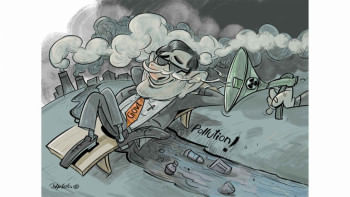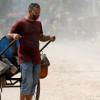Take strict action to improve Dhaka’s air

Dhaka's air quality has consistently ranked among the worst in the world for several years. While it remains unhealthy during the dry season, it improves slightly during the monsoon. However, with the onset of winter, the city's air quality has reached "unhealthy," "very unhealthy," and even "hazardous" levels on some days, according to AQAir. On Wednesday, for instance, the concentration of particulate matter or PM2.5—the primary component of air pollution—was 34 percent higher than the World Health Organization's standard, with the city being ranked second worst globally with an AQI of 249. Previously, on December 5 and 9, its air quality was classified as "hazardous," with the AQI exceeding 300.
If pollution remains at "hazardous" levels for at least three hours over three consecutive days, a health emergency is supposed to be declared. However, in Dhaka, we have never seen the authorities declare such an alert. While residents suffered from the extremely polluted air, the authorities were either inactive or misappropriated funds intended for air pollution control projects. This time, however, the environment ministry has urged people to wear masks outdoors and recommended that "sensitive individuals" avoid going outside unless absolutely necessary. But we must ask, is this enough?
For years, reports have repeatedly highlighted the health risks of polluted air, but little has been done. According to a World Bank report, air pollution accounts for about 20 percent of premature deaths in Bangladesh. Another study found that poor air quality is contributing to rising rates of premature births and low birth weight in babies born in Dhaka. Yet another study revealed that the average life expectancy in Bangladesh is being shortened by 6.8 years due to continuous exposure to polluted air. Air pollution has now become the leading cause of death in Bangladesh, surpassing deaths caused by high blood pressure, poor diet, and tobacco use, according to a global study.
While past governments failed to act, we hope the interim government will not make the same mistake. In addition to implementing a regular alert system for the public, as directed by the High Court in February, the government must take decisive action to tackle the known sources of pollution. It is crucial that they urgently enforce environmental guidelines for construction firms and brick kilns and also remove all outdated vehicles from our roads. The time to act is now.


 For all latest news, follow The Daily Star's Google News channel.
For all latest news, follow The Daily Star's Google News channel. 










Comments